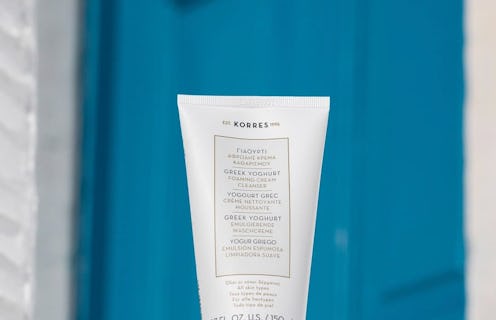(Beauty)
Why Greek Beauty Is Poised To Be The Next Big Skin Trend

I've always liked my skincare with a side of philosophy — pondering the evolution of beauty ideals provides endless material to mine for meaning — and on that point, I’m not alone. The ancient Greeks did, too. “Greek beauty has always been about holistic wellness,” Kassandra Lefakinis, the founder of Athens-based brand Opuntia Luxury Oils, tells me. “As the holistic wellness concept included beauty, so did it include philosophy.” The particular philosophy that fuels the Greek beauty industry (and the Greek skincare products it produces) is “pan metron ariston,” Lefakinis says. Roughly translated: “All with measure, or rather, nothing in excess. Balance is key.”
Considering that’s pretty much the philosophy fueling today’s wellness-as-beauty movement — holistic therapies, simpler skincare, a return to nature — it’s curious that “Greek beauty” hasn’t yet become A Thing. At least, not at the level of K-beauty and J-beauty. But whether or not it’s in the headlines, it is influencing the industry, and has since, oh, the beginning of time. (Even the root of the word “holistic,” holos, is Greek.)
“In ancient Greece, there were some very high standards regarding beauty,” Dimitra Goula, founder of her namesake skincare line, tells The Zoe Report. Women would apply berry pulp as blush, henna as nail polish, and even “use painted hair from sheep to elongate their lashes,” Goula says. “Most Greek women were creating their own skincare before the revolution of the chemical industry of cosmetics, and every family maintained their own recipes with pride from generation to generation.” One such recipe, created by Greek healer Galinos, is still the basis for modern cold cream: beeswax, olive oil, and rose water.
Yes, in addition to philosophy and holism, Greece is also the birthplace of some of nature’s most powerful skin healers; chief among them, wild olive oil. “Wild olives are perennial trees which grow on barren rocks, yet they are so resilient that they grow and bloom without any care,” Goula explains, and it’s thought that this resiliency is passed on through the oil. Research has shown that wild-grown plants do have a higher nutritional content, which may explain why Greek olive oil in particular is so revered. “Another ingredient worth mentioning is the chestnut wax that grows exclusively on the holy mountain of Mount Athos,” Goula says. “It has powerful anesthetic, nourishing, anti-aging, and healing properties, and is an essential ingredient in many of our products and treatments.”
I was surprised to find that prickly pear grows wild in Greece, as well; I always picture it thriving in African deserts or the American southwest. But prickly pear, “also known as opuntia, or 'frangosiko' in Greek, or the 'miracle plant,' beautifies the local landscape,” Lefakinis says — not to mention, the local complexions. Opuntia seed oil is the star ingredient in both of Opuntia Luxury Oils' offerings (and, obviously, the inspiration for the brand's name). “It’s full of antioxidants, vitamin E, and essential fatty acids that slow aging, increase collagen production, decrease wrinkles, and protect against UV rays,” the founder says. “It has a satiny texture and is easily absorbed, penetrating the skin quickly without being greasy.”
Mastic resin is another uniquely Greek ingredient that’s made its way into the beauty scene — most notably in the Too Cool For School Rules of Mastic line — sourced from the country’s native mastic trees, on the island of Chios. The locals know the ingredient as “tears of Chios,” since as it's released, the resin resembles sparkling teardrops falling from the tree trunks. The substance has antibacterial and anti-inflammatory properties, and is used to soften skin, strengthen the barrier, and lock in moisture.
Truthfully, that barely scratches the surface of Greek ingredients; there are so many more to discover, both obscure (nard essential oil, a radiance-booster) and familiar (Greek yogurt, of course). Ahead, 10 Greek beauty products to inspire continued discovery — although you certainly don’t need to collect them all. Remember: Pan metron ariston. Nothing in excess.
Shop Greek Beauty
This article was originally published on